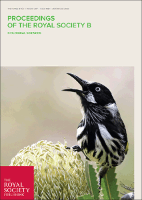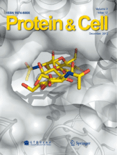
PERIODICUM BIOLOGORUM
Scope & Guideline
Empowering Researchers Through Quality Scholarship
Introduction
Aims and Scopes
- Molecular and Cellular Biology:
Research examining the molecular mechanisms underlying cellular functions, including studies on gene expression, protein interactions, and cellular signaling pathways. - Ecology and Environmental Biology:
Investigations into ecological dynamics, species interactions, and the impact of environmental changes on biodiversity and ecosystem health. - Microbiology and Pathogen Research:
Studies focusing on microbial diversity, pathogenicity, and interactions between microorganisms and their hosts, including implications for health and disease. - Biotechnology and Applied Biology:
Research applying biological principles to technology, including genetic engineering, bioinformatics, and the development of new biotechnological applications. - Neuroscience and Behavioral Biology:
Exploration of the biological underpinnings of behavior, neurophysiology, and the impact of biological factors on psychological processes. - Histology and Microscopy Techniques:
Development and application of advanced microscopy techniques for studying biological tissues and cells, contributing to better visualization and understanding of biological structures.
Trending and Emerging
- Interdisciplinary Approaches in Biology:
There is a noticeable trend towards integrating multiple disciplines within biological research, such as combining microbiology, ecology, and molecular biology to address complex biological questions. - Impact of Climate Change on Biodiversity:
Research focusing on how climate change affects species distribution, ecosystem services, and biodiversity conservation is increasingly prevalent, reflecting global environmental concerns. - Health and Disease Interconnection with Microbiota:
A growing body of work explores the relationship between human health and microbiota, emphasizing the role of microbial communities in health outcomes and disease prevention. - Innovative Imaging Techniques:
The application of advanced imaging and microscopy techniques is rising, allowing for more detailed studies of cellular and molecular processes, thus enhancing our understanding of biological systems. - Bioinformatics and Data Science in Biology:
The integration of bioinformatics tools and data science methodologies into biological research is on the rise, facilitating large-scale data analysis and interpretation in genomics and proteomics.
Declining or Waning
- Traditional Taxonomy:
Research specifically dedicated to the classical taxonomy of species has decreased, possibly due to a shift towards molecular and genetic approaches to classification. - Invasive Species Studies:
While still relevant, the frequency of publications specifically addressing invasive species management and studies has diminished, potentially overshadowed by broader ecological and environmental topics. - Single-Disease Focused Research:
Studies concentrating exclusively on single diseases without broader ecological or systemic perspectives have seen a reduction, as there is a growing emphasis on multi-faceted approaches to health. - Historical Biological Studies:
Papers focused solely on historical perspectives of biological research are less frequent, indicating a move towards contemporary applications and immediate relevance in the field.
Similar Journals

Cell Reports Methods
Empowering Researchers with Cutting-Edge TechniquesCell Reports Methods is a cutting-edge journal published by CELL PRESS, focusing on innovative methodologies in the vast fields of biochemistry, genetics, biotechnology, and radiological sciences. Launched in 2021, it has rapidly ascended to attain a Q1 ranking across multiple disciplines in the latest 2023 metrics, reflecting its influential contribution to the scientific community. With an emphasis on practical and rigorous experimental approaches, this journal serves as a vital resource for researchers looking to advance their methodologies and collaborate on significant findings in their respective specialties. Despite not being an open-access publication, Cell Reports Methods ensures broad accessibility through institutional subscriptions, allowing researchers from various backgrounds to engage with high-quality scholarly work. The journal presents a unique platform for sharing insights from interdisciplinary methods that foster innovation and discovery, ultimately shaping the future of scientific research.

FEBS Open Bio
Empowering the scientific community with groundbreaking knowledge.FEBS Open Bio is a leading open-access journal published by Wiley, dedicated to advancing our understanding of biochemistry, genetics, and molecular biology. Since its inception in 2011, this journal has provided a robust platform for researchers to share their findings with a wider audience, ensuring the dissemination of high-quality scientific knowledge. With an impact factor reflecting its stature in its field, FEBS Open Bio is ranked #77 out of 221 in general biochemistry, genetics, and molecular biology, placing it in the 65th percentile among its peers. This journal serves as an essential resource for professionals, researchers, and students alike, fostering collaboration and innovation within the scientific community. The commitment to open access not only enhances visibility but also promotes transparency in research, making it a vital contributor to the ongoing dialogue in biochemical and molecular biological sciences. For those looking to stay at the forefront of research developments, FEBS Open Bio is a key publication addressing the latest trends and discoveries in the field.

Open Life Sciences
Bridging Disciplines in Life Sciences ExcellenceOpen Life Sciences is a distinguished open-access journal published by DE GRUYTER POLAND SP Z O O, dedicated to advancing research across diverse disciplines in the life sciences. Since its inception in 2014 and transitioning to open access in 2015, the journal has become a pivotal platform for researchers, fostering the dissemination of high-quality scientific work while ensuring that valuable findings are freely accessible to the global community. With an impressive categorization into Q2 in Agricultural and Biological Sciences and Q3 in several other fields including Biochemistry and Immunology as of 2023, Open Life Sciences promotes innovation and knowledge sharing across its broad spectrum of topics. The journal's commitment to excellence is reflected in its competitive Scopus rankings, making it an essential resource for professionals and students alike who are keen to stay at the forefront of life sciences research.

Biology Direct is a leading open-access journal published by BMC, dedicated to disseminating groundbreaking research in the fields of biological sciences. Since its inception in 2006, the journal has emerged as a pivotal platform for scholars, researchers, and practitioners, providing unrestricted access to high-quality, peer-reviewed articles that cover a wide spectrum of topics, including biochemistry, ecology, and applied mathematics. With an impressive ranking in the first quartile across multiple scientific categories, including Agricultural and Biological Sciences and Biochemistry, Genetics, and Molecular Biology, Biology Direct is recognized for its rigorous standards and impactful contributions within the academic community. The journal's open-access model ensures that research findings reach a global audience, fostering collaboration and innovation. Researchers and students looking to stay ahead in the rapidly evolving biological sciences will find Biology Direct an invaluable resource for knowledge and insight.

PROCEEDINGS OF THE ROYAL SOCIETY B-BIOLOGICAL SCIENCES
Cultivating Insights in Biological DiversityPROCEEDINGS OF THE ROYAL SOCIETY B-BIOLOGICAL SCIENCES, published by the esteemed Royal Society, stands as a premier platform for disseminating cutting-edge research in the fields of Biological Sciences. With an impressive impact factor reflective of its high citation rates and scholarly contributions, this journal encompasses a wide array of disciplines, including Agricultural and Biological Sciences, Biochemistry, Genetics and Molecular Biology, Environmental Science, and Immunology and Microbiology, consistently ranking in the Q1 category across these fields. Since its inception in 1946, it has been committed to advancing our understanding of biological systems and informing evidence-based practices. Researchers and academics can submit their work without the Open Access barrier, thereby maintaining the integrity of the disciplinary discourse while providing comprehensive insights. The journal's location in the United Kingdom also positions it at the heart of global scientific innovation, making it a vital resource for professionals and students alike who are eager to explore the latest trends and breakthroughs in the biological sciences.

JOURNAL OF BIOSCIENCES
Advancing the Frontiers of Biosciences ResearchJOURNAL OF BIOSCIENCES, published by the Indian Academy of Sciences, has established itself as a pioneering platform in the fields of biosciences, encompassing diverse research areas such as agricultural and biological sciences, biochemistry, genetics, molecular biology, and medicine. With an impressive trajectory since its inception in 1979, the journal has achieved notable recognition, securing a Q1 ranking in Agricultural and Biological Sciences and maintaining its place in the top quartiles for Biochemistry and Medicine as of 2023. With Scopus rankings placing it at #32 in General Agricultural and Biological Sciences and #65 in General Biochemistry, Genetics, and Molecular Biology, the journal reaches the 85th and 70th percentiles respectively, reflecting its impact and relevance in current scientific discourse. Although it does not offer open access, the JOURNAL OF BIOSCIENCES remains crucial for researchers, professionals, and students dedicated to advancing knowledge and innovation within the biosciences, providing a vibrant forum for high-quality research and comprehensive reviews.

COMPTES RENDUS BIOLOGIES
Pioneering Research for a Sustainable FutureCOMPTES RENDUS BIOLOGIES, published by the esteemed Académie des Sciences, is a prominent journal based in France that contributes significantly to the fields of Agricultural and Biological Sciences, Biochemistry, Genetics and Molecular Biology, as well as Immunology and Microbiology. With a notable Q3 ranking in several categories as of 2023, this journal serves as an essential platform for disseminating groundbreaking research and advancements in these disciplines. Access is currently available under open access options, enhancing the reach and accessibility of its published findings. The journal has been in continuous publication since 1959, with a current focus extending to 2024, ensuring that it remains at the forefront of scientific communication. With its diverse scope and commitment to quality research, COMPTES RENDUS BIOLOGIES plays a crucial role in fostering dialogue and collaboration among researchers, professionals, and students who are dedicated to understanding and addressing complex biological questions.

Protein & Cell
Advancing Knowledge in Biochemistry and Cell BiologyProtein & Cell, published by Oxford University Press, is a distinguished international journal focusing on cutting-edge research in the fields of biochemistry, biotechnology, cell biology, and drug discovery. This open access journal, active since 2014, is dedicated to disseminating innovative findings that advance our understanding of protein functions and cellular processes, making it an essential resource for researchers, professionals, and students alike. With an impressive 2023 impact factor reflected in its Q1 ranking across multiple categories such as Biochemistry, Drug Discovery, and Cell Biology, 'Protein & Cell' stands at the forefront of scientific research, driving collaboration and discussion in the scientific community. Researchers can access the journal freely online, fostering a global exchange of knowledge and contributing to significant advancements in medicine and biotechnology. Located in the United Kingdom, the journal strives to be a pivotal platform for impactful research that influences future studies and applications.

BIOLOGICAL RESEARCH
Pioneering research for a healthier tomorrow.BIOLOGICAL RESEARCH is a prestigious, peer-reviewed journal published by the Société de Biologie de Chile, dedicated to advancing the fields of Agricultural and Biological Sciences, Biochemistry, Genetics, and Molecular Biology, and Medicine. With an impressive ranking in the top quartile (Q1) in these categories as of 2023, this journal maintains high academic standards and visibility, making it a vital resource for researchers and professionals alike. Operating under an Open Access model since 2013, it ensures that research findings are freely accessible to a global audience, promoting the dissemination of knowledge and collaboration across disciplines. With a publication history dating back to 1992 and continued updates until 2024, BIOLOGICAL RESEARCH serves as a crucial platform for innovative research that impacts both scientific and healthcare communities. The journal’s commitment to quality and relevance is evidenced by its competitive performance in Scopus rankings, further solidifying its role as a leading journal within the biological sciences.

BIOLOGY BULLETIN
Illuminating Pathways in Agricultural Science and Research.BIOLOGY BULLETIN is a prominent academic journal published by PLEIADES PUBLISHING INC, dedicated to advancing the fields of Agricultural and Biological Sciences as well as Biochemistry, Genetics, and Molecular Biology. With an ISSN of 1062-3590 and E-ISSN of 1608-3059, the journal has been a vital resource for researchers and professionals since its commencement in 1996. Located in the United States, BIOLOGY BULLETIN operates within a highly competitive academic landscape, achieving a 2023 ranking in the Q3 quartile for Agricultural and Biological Sciences and Q4 for Biochemistry, Genetics, and Molecular Biology, highlighting its commitment to delivering impactful research despite its challenges. Researchers seeking to publish their findings will find a platform for significant insights, as reflected in its Scopus rankings, where it stands at #183 and #199 out of 221 in its respective categories, showcasing opportunities for growth and visibility. While currently not an open-access publication, BIOLOGY BULLETIN plays a crucial role in facilitating scholarly communication and fostering an understanding of biological sciences, making it an essential read for academics, professionals, and students alike.